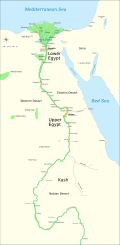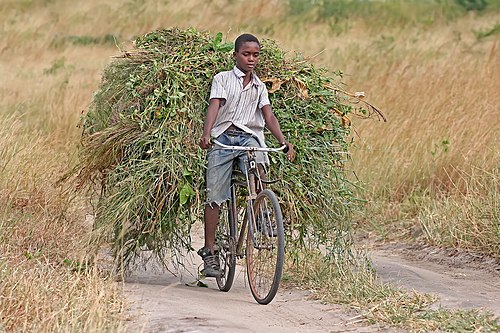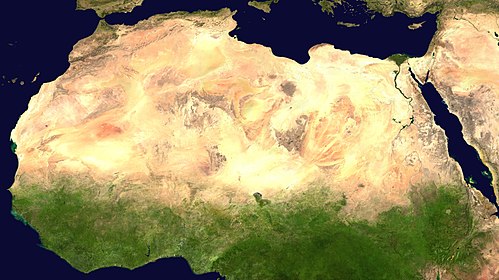Portal:Africa



Africa is the world's second-largest and second-most populous continent after Asia. At about 30.3 million km2 (11.7 million square miles) including adjacent islands, it covers 20% of Earth's land area and 6% of its total surface area. With nearly 1.4 billion people as of 2021, it accounts for about 18% of the world's human population. Africa's population is the youngest among all the continents; the median age in 2012 was 19.7, when the worldwide median age was 30.4. Based on 2024 projections, Africa's population will exceed 3.8 billion people by 2100. Africa is the least wealthy inhabited continent per capita and second-least wealthy by total wealth, ahead of Oceania. Scholars have attributed this to different factors including geography, climate, corruption, colonialism, the Cold War, and neocolonialism. Despite this low concentration of wealth, recent economic expansion and a large and young population make Africa an important economic market in the broader global context, and Africa has a large quantity of natural resources.
Africa is highly biodiverse; it is the continent with the largest number of megafauna species, as it was least affected by the extinction of the Pleistocene megafauna. However, Africa is also heavily affected by a wide range of environmental issues, including desertification, deforestation, water scarcity, and pollution. These entrenched environmental concerns are expected to worsen as climate change impacts Africa. The UN Intergovernmental Panel on Climate Change has identified Africa as the continent most vulnerable to climate change.
The history of Africa is long, complex, and varied, and has often been under-appreciated by the global historical community. In African societies the oral word is revered, and they have generally recorded their history via oral tradition, which has led anthropologists to term them "oral civilisations", contrasted with "literate civilisations" which pride the written word. African culture is rich and diverse both within and between the continent's regions, encompassing art, cuisine, music and dance, religion, and dress.
Africa, particularly Eastern Africa, is widely accepted to be the place of origin of humans and the Hominidae clade, also known as the great apes. The earliest hominids and their ancestors have been dated to around 7 million years ago, and Homo sapiens (modern human) are believed to have originated in Africa 350,000 to 260,000 years ago. In the 4th and 3rd millennia BCE Ancient Egypt, Kerma, Punt, and the Tichitt Tradition emerged in North, East and West Africa, while from 3000 BCE to 500 CE the Bantu expansion swept from modern-day Cameroon through Central, East, and Southern Africa, displacing or absorbing groups such as the Khoisan and Pygmies. Some African empires include Wagadu, Mali, Songhai, Sokoto, Ife, Benin, Asante, the Fatimids, Almoravids, Almohads, Ayyubids, Mamluks, Kongo, Mwene Muji, Luba, Lunda, Kitara, Aksum, Ethiopia, Adal, Ajuran, Kilwa, Sakalava, Imerina, Maravi, Mutapa, Rozvi, Mthwakazi, and Zulu. Despite the predominance of states, many societies were heterarchical and stateless. Slave trades created various diasporas, especially in the Americas. From the late 19th century to early 20th century, driven by the Second Industrial Revolution, most of Africa was rapidly conquered and colonised by European nations, save for Ethiopia and Liberia. European rule had significant impacts on Africa's societies, and colonies were maintained for the purpose of economic exploitation and extraction of natural resources. Most present states emerged from a process of decolonisation following World War II, and established the Organisation of African Unity in 1963, the predecessor to the African Union. The nascent countries decided to keep their colonial borders, with traditional power structures used in governance to varying degrees. (Full article...)
Selected article –
The Chilembwe uprising was a rebellion against British colonial rule in Nyasaland (modern-day Malawi) which took place in January 1915. It was led by John Chilembwe, an American-educated Baptist minister. Based around his church in the village of Mbombwe in the south-east of the colony, the leaders of the revolt were mainly from an emerging black middle class. They were motivated by grievances against the British colonial system, which included forced labour, racial discrimination and new demands imposed on the African population following the outbreak of World War I.
The revolt broke out in the evening of 23 January 1915 when rebels, incited by Chilembwe, attacked the headquarters of the A. L. Bruce Estates at Magomero and killed three white settlers. A largely unsuccessful attack on a weapons store in Blantyre followed during the night. By the morning of 24 January, the colonial authorities had mobilised the Nyasaland Volunteer Reserve (NVR) and called in regular troops from the King's African Rifles (KAR). After a failed attack by KAR troops on Mbombwe on 25 January, the rebels attacked a Christian mission at Nguludi and burned it down. The KAR and NVR captured Mbombwe without encountering any resistance on 26 January. Many of the rebels, including Chilembwe himself, fled towards Portuguese Mozambique, hoping to reach safety there, but many were captured. About 40 rebels were executed in the revolt's aftermath, and 300 were imprisoned; Chilembwe was shot dead by a police patrol near the border on 3 February. (Full article...)
Featured pictures –
Did you know (auto-generated) -

- ... that one way to tell the African dusky flycatcher apart from the ashy flycatcher is that the former is "cuter"?
- ... that women seeking abortions in Eswatini or in Lesotho may travel to neighbouring South Africa, where it is legal?
- ... that William H. Davis was the first teacher of Booker T. Washington and the first African American to be nominated as a candidate for West Virginia governor in 1888?
- ... that the 1862 Brooklyn riot involved a mob mainly comprising Irish Americans targeting African-American workers at a tobacco factory?
- ... that Patrick Pillay negotiated Seychelles' re-entry into the Southern African Development Community with a reduced membership fee?
- ... that the Octavius V. Catto Memorial, unveiled in 2017, contains the first statue on Philadelphia public property of a specific African American?
Categories
Selected biography –
Patrice Émery Lumumba (/pəˈtriːs lʊˈmʊmbə/ ⓘ pə-TREESS luu-MUUM-bə; born Isaïe Tasumbu Tawosa; 2 July 1925 – 17 January 1961) was a Congolese politician and independence leader who served as the first prime minister of the Democratic Republic of the Congo (then known as the Republic of the Congo) from June until September 1960, following the May 1960 election. He was the leader of the Congolese National Movement (MNC) from 1958 until his assassination in 1961. Ideologically an African nationalist and pan-Africanist, he played a significant role in the transformation of the Congo from a colony of Belgium into an independent republic.
Shortly after Congolese independence in June 1960, a mutiny broke out in the army, marking the beginning of the Congo Crisis. After a coup, Lumumba attempted to escape to Stanleyville to join his supporters who had established a new anti-Mobutu state called the Free Republic of the Congo. Lumumba was captured en route by state authorities under Joseph-Désiré Mobutu, sent to the State of Katanga and, with the help of Belgian mercenaries, tortured and executed by the separatist Katangan authorities of Moïse Tshombe. In 2002, Belgium formally apologised for its role in the execution, admitting "moral responsibility", and in 2022, they returned Lumumba’s tooth to his family. He is seen as a martyr for the pan-African movement. (Full article...)
Selected country –
 |
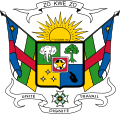 |
|
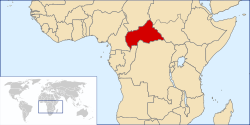
| ||
The Central African Republic (CAR, French: République Centrafricaine IPA: /ʀepyblik sɑ̃tʀafʀikɛn/ or Centrafrique /sɑ̃tʀafʀik/) is a landlocked country in Central Africa. It borders Chad in the north, Sudan in the east, the Republic of the Congo and the Democratic Republic of the Congo in the south, and Cameroon in the west. Most of the CAR consists of Sudano-Guinean savannas but it also includes a Sahelo-Sudanese zone in the north and an equatorial forest zone in the south.
Since most of the territory is located in the Ubangi and Shari river basins, the French called the colony it carved out in this region Ubangi-Shari, or Oubangui-Chari in French. The colony became a semi-autonomous territory of the French Community in 1958 and then an independent nation on 13 August 1960. The first fair democratic elections, held in 1993, brought Ange-Félix Patassé to power. Patassé was overthrown by French-backed General François Bozizé in 2003, who won a democratic election in May 2005 and remains in power today. (Read more...)
Selected city –

Ouagadougou or Wagadugu (/ˌwɑːɡəˈduːɡuː/, Mossi: Waogdgo Mossi: [ˈwɔɣədəɣʊ], Dyula: Wagadugu, French: Ouagadougou French: [waɡaduɡu]) is the capital city of Burkina Faso, and the administrative, communications, cultural and economic centre of the nation. It is also the country's largest city, with a population of 2,415,266 in 2019. The city's name is often shortened to Ouaga. The inhabitants are called ouagalais. The spelling of the name Ouagadougou is derived from the French orthography common in former French African colonies.
Ouagadougou's primary industries are food processing and textiles. It is served by an international airport and is linked by rail to Abidjan in the Ivory Coast and, for freight only, to Kaya. There are several highways linking the city to Niamey, Niger, south to Ghana, and southwest to Ivory Coast. Ouagadougou has one of West Africa's largest markets, which burned down in 2003 and has since reopened with better facilities and improved fire-prevention measures. Other attractions include the National Museum of Burkina Faso, the Moro-Naba Palace (site of the Moro-Naba Ceremony), the National Museum of Music, and several craft markets. (Full article...)
In the news
- 12 April 2025 – Sudanese Civil War
- Siege of El Fasher
- Zamzam and Abu Shouk refugee camp massacres
- At least 100 people, including 20 children, are killed in Rapid Support Forces attacks on Al-Fashir and two nearby displacement camps in North Darfur, Sudan, according to the United Nations. (Hindustan Times)
- 11 April 2025 – Immigration policy of the second Donald Trump administration
- The U.S. terminates the temporary protected status of Afghan and Cameroonian nationals. (BBC)
- 10 April 2025 – Land reform in Zimbabwe
- Zimbabwe begins issuing the first financial compensation payments to White Zimbabwean farmers whose farms were seized by Robert Mugabe's government between 2000 and 2002. A total of 740 farmers will be compensated as per the 2020 agreement with the Commercial Farmers' Union. (BBC News)
- 8 April 2025 –
- The death toll from the heavy flooding in Kinshasa, Democratic Republic of the Congo, caused by overflow of the Ndjili River increases to 33 deaths. Hundreds of buildings are completely submerged and thousands of people are trapped in their homes. (NPR) (DW)
Updated: 11:05, 13 April 2025
General images -
Africa topics
More did you know –
- ...that Rukwanzi Island, an island in Lake Albert, one of the African Great Lakes, is the subject of a territorial dispute between the Democratic Republic of the Congo and Uganda?
- ...that Oumarou Sidikou, vice-governor of the Central Bank of West African States from 1988 to 1993, was a minister in the government of Nigerien Prime Minister Hama Amadou, which was ousted by a military coup in 1996?
- ...that Jason Dunford, an All-Africa Games gold medalist and runner-up for the 2006 Kenyan Sportsman of the Year award, has a younger brother who was selected "most promising sportsman" at the same awards?
- ...that Sam Mbakwe, governor of Imo State from 1979 to 1983, served in the army of the Republic of Biafra, an Igbo secessionist state in southeastern Nigeria, during the Nigerian Civil War?
Related portals
Major Religions in Africa
North Africa
West Africa
Central Africa
East Africa
Southern Africa
Associated Wikimedia
The following Wikimedia Foundation sister projects provide more on this subject:
-
Commons
Free media repository -
Wikibooks
Free textbooks and manuals -
Wikidata
Free knowledge base -
Wikinews
Free-content news -
Wikiquote
Collection of quotations -
Wikisource
Free-content library -
Wikispecies
Directory of species -
Wikiversity
Free learning tools -
Wikivoyage
Free travel guide -
Wiktionary
Dictionary and thesaurus










